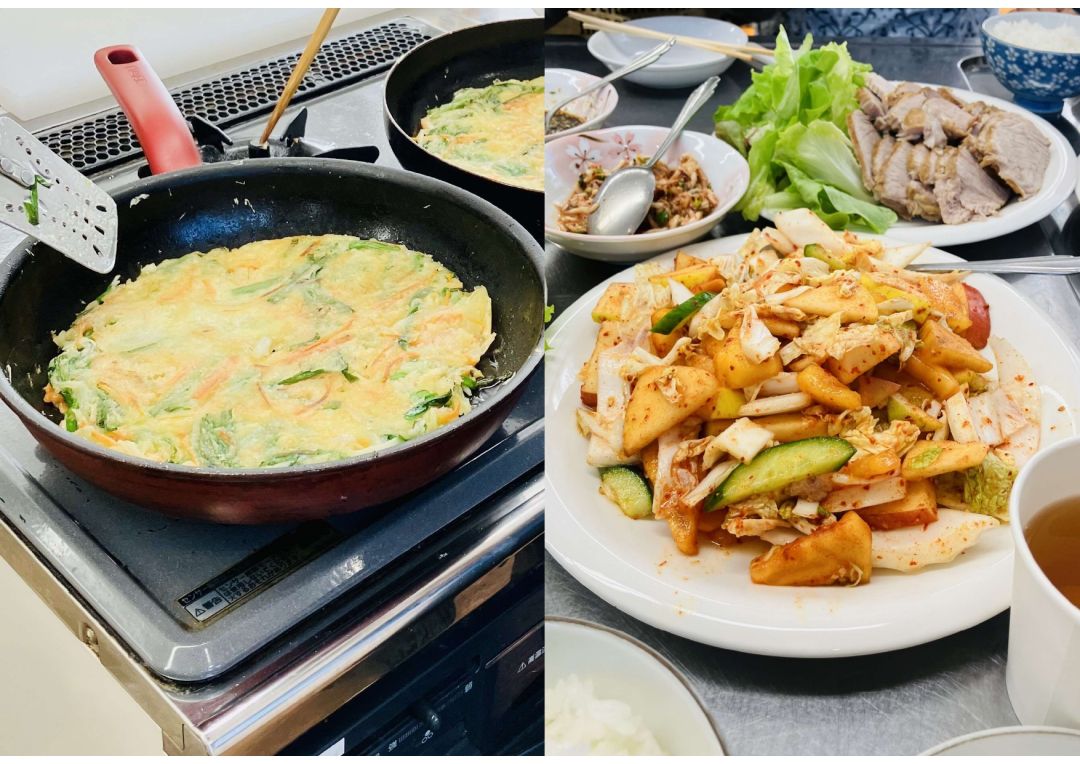Cultures·Events
Cultures·Events
Contents
◆Report of the 17th Japanese Speech Contest by Foreign Residents in Kawaguchi City
◆Wrestlers keeps on going in God dwelling Dohyo 〜Visit to Minato beya・the realm of Sumo〜
◆Bring a Wholesome Body and Mind with Karate Training! ~Shiwasuda Elementary School Karate Course~
Report of the 17th Japanese Speech Contest by Foreign Residents in Kawaguchi City
On November 15th 2025, “the 17th Japanese Speech Contest by Foreign Residents in Kawaguchi City” was held at a Citizen’s hall “FRIENDIA”, next to Kawaguchi Station. Seven contestants from three countries appeared on the stage to talk their experiences and thoughts in Japanese on themes of “My discovery from the life in Kawaguchi”, “Difference between Japan and my home country”., etc.
They candidly talked about puzzlement, thrills, trivial awareness, etc., which they have found from their lives in Japan and which deeply moved the audience. It was something impressive seeing them faithfully trying to deliver speeches in their own words with smiles though we knew they were all tensed up on this big day.
▼Contest Result
Gold Prize
ZHAO XIANG (China)
“Meeting a Better Myself”
Silver Prize
AYE KYI PHYU (Myanmar)
“My Environmental Revolution Started with Garbage Separation by Material”
Bronze Prize
WANG SHUANG (China)
“Reason of My Being in Japan”
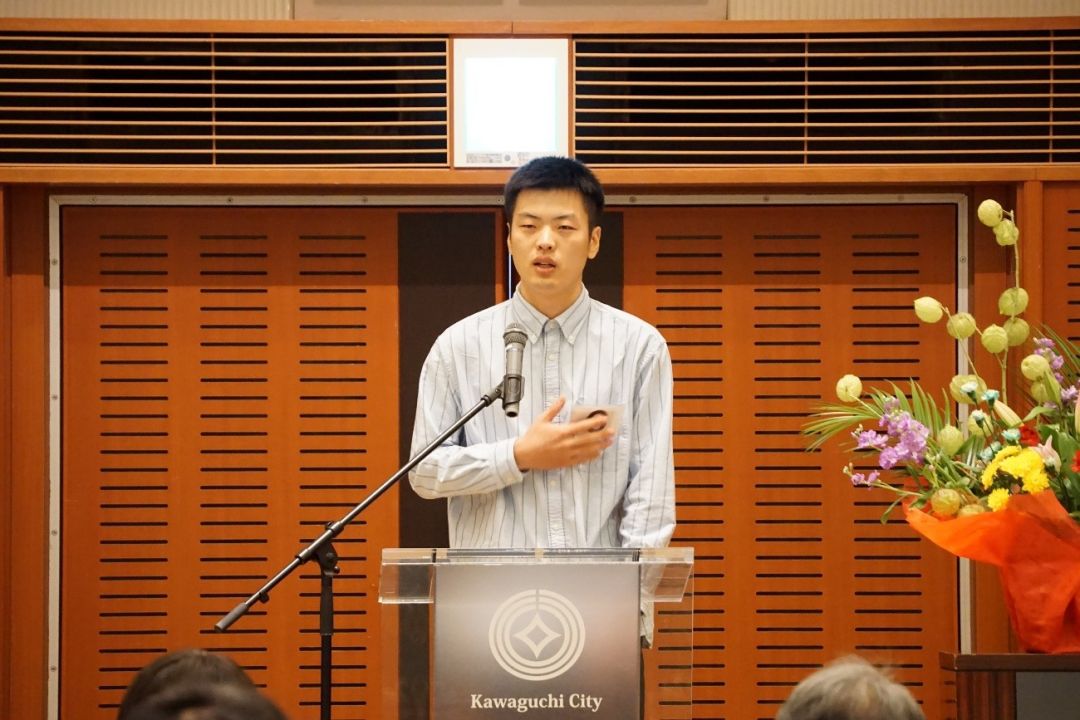
▼Little talk with a Gold Prize Winner
Gold Prize Winner of this year was Mr. Zhao Xiang from China.
Came to Japan in July 2025, he is enthusiastically learning Japanese while working in the IT industry.
Saying, “Fond of Mt. Fuji”, his friendly smile was standing out.
Although he was learning Japanese for two years back in China, he had numerous setbacks and troubles in communication when he came to Japan because his language skill did not seem to reach the required level.
What saved his distress was the teaching staff and classmates of a Japanese language class.
Currently, he is concentrating on learning grammatical rules.
“I will devote more time on learning Japanese to be able to speak this language as native speakers do”, he said.
From the way he talked, I could tell his faithfulness and ambition, and earnest devotion towards learning.
His parents, who had just come from China to back him up on the contest day, were also pleased with his Gold Prize winning.
Not far in the future, Mr. Zhao’s life, who have found “Meeting a Better Myself” in Japan, will be blessed and full of hope than ever before.
▼Fascinating speeches evolved from cross-cultural communication
Contestants impressed us with speeches full of episodes stemmed from their own life experiences.An episode of having found a place to belong to from a heartwarming mingling at a Japanese language class.
An episode of being saved by the warmth of a hand held out at the time of giving birth.Also, there was another impressive episode of a garbage separation, which appears to be a small act for us, had thoroughly changed one’s awareness and values towards environmental issues.
Episodes shared by all were experiences when they first noticed “Japanese kindness”.
A gentle voice of help when they were in troubles.
A person who tried to communicate with smiles and gestures when they did not share a common language.
I well understood that such encounters had alleviate anxieties and encouraged them to have a strength to keep going.
Every speech, which was openly delivered to us, had a message of Endeavor/Courage/Gratitude. The hall was filled with warm applause over and over.
▼“The Spirit to Enjoy the Difference” led the Hall
This speech contest is not just a mere performance to show how you have improved Japanese language. It gives an opportunity to know more about each other by knowing cultural and valuable differences. “Hoping to respect each other”; such positive words were scattered everywhere. This occasion gave us a crucial insight for living in a society of diverse values.
▼The Appeal of Diversity-friendly Kawaguchi
Having many foreign residents, multicultural coexistence became a common atmosphere in Kawaguchi City. The contest is one of the symbolic events of this atmosphere, offering a precious opportunity to share the essence of “Tell” and “Try to understand” by overcoming the barriers on both language and culture.
Editor’s Note
I sincerely hope that this contest keeps playing a role of connecting residents and their minds. I am looking forward to come back to this contest next year to hear more fascinating stories. It might be you who will win the Gold Prize next year. (TOMO) ▲Back to Table of Contents▲
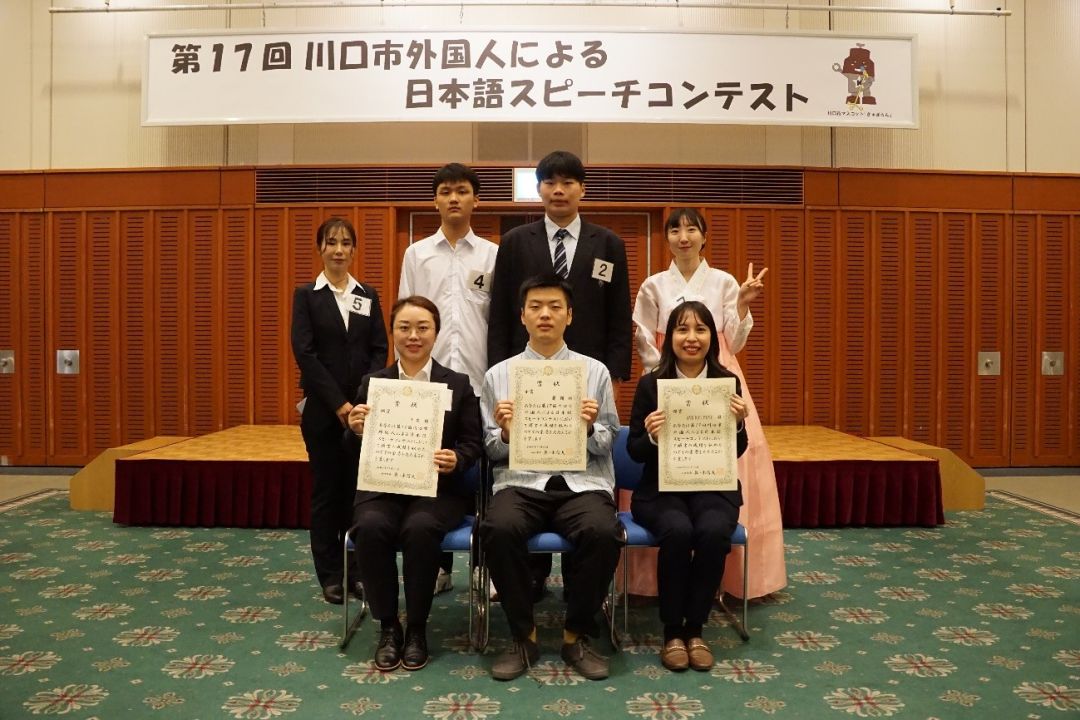
Wrestlers keeps on going in God dwelling Dohyo 〜Visit to Minato beya・the realm of Sumo〜
When you hear a word “Sumo”, what sort of images come up to your mind?
Just a martial art where huge wrestlers are bumping at each other—to someone who has this idea, I would like to show you a bit about the quintessence of it hidden in the depth of the Japanese tradition.
Originally, Sumo is a divine service offering to God. It is a sacred performance to pray for bumper crop, prosperity of a region, and a Dohyo-wrestling ring in which wrestlers stand is supposed to be “a sacred place where God dwells”.
Even performance of Shiko (movements of a wrestler lifts a leg high up in the air and stamps it powerfully on the ground inside Dohyo) has a meaning, also competition itself is not just a strength contest. Sacredness and prayer exist within each movement.
Still, people often say, “Do not know much about Sumo”, “How do I enjoy watching it?”. To those who have such questions, I visited Minato beya-Sumo stable seeking for answers.
◆One day at Minato beya ~Sumo wrestlers’ life~
7:00 Wake-up
↓
7:30 Training
↓
10:30 Bathing
↓
11:30 Chanko Lunch
↓
14:00 Napping・Rest
↓
16:00 Room cleaning
↓
16:30 (Tue・Thu・Sat) Self-imposed training
↓
18:00 Chanko Dinner・Free time
↓
23:00 Lights-out
Dohyo enveloped by tenseness. The only sounds resonating in the dead-silent morning training place are bumping sounds of wrestlers’ bodies, vibrating sounds from Shiko, and breathings of wrestlers.
At 7 am, tense atmosphere is already filling the training place of Minato beya.
Bump…… Bump……
Wrestlers are repeatedly stamping Shiko steps. Shiko is said to be a traditional movement of clearing away a noxious vapor, but at the same time it is considered as one of the indispensable practical trainings to toughen wrestler’s body.
After doing Shiko, basic training has begun.
“Watch carefully, tighten your stomach muscle……, that is it, that is it”
Oyakata-stable master’s voice is reverberating around the place. Wrestlers are listening carefully to Oyakata’s instructions and earnestly following them. After a while, the tenseness grew to the point of starting a match practice.
This is a tournament-style practice match in which a winner stays in Dohyo to keep taking on new opponents.
Bumping sound of bodies, heavy breathings started to fill the training place. No matter how many times they get thrown to the ground, they will stand up. Hungry looks of each wrestler tensed up the atmosphere of the place to a higher level.
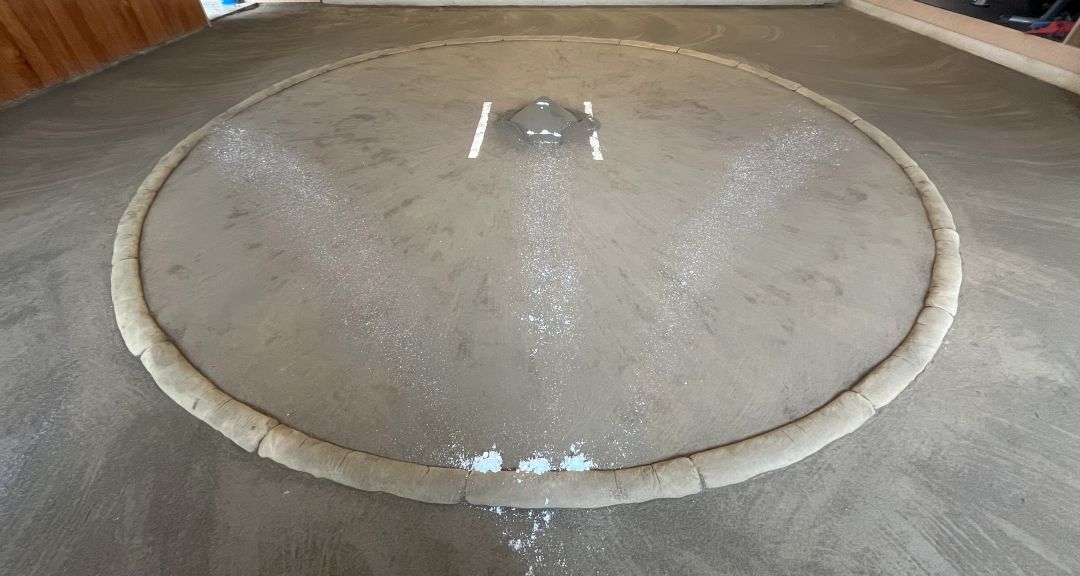
◆“Magnetism of Sumo” talked by Minato Oyakata
During the recess, I could have a word with Minato Oyakata.
“Sumo match is controlled by a tiny fraction of a second. The result may be largely controlled by the slightest agitation or difference of fighting spirits. That is exactly why we give importance to an accumulation of regular training”.
Saying this, Minato Oyakata’s eyes were still calmly fixed on Dohyo.
“Unlike score gaining matches, we cannot get our eyes off Dohyo since a split-second movement decides the result. The slightest slackness can be fatal”.
Oyakata even told me the points to enjoy watching Sumo matches.
“You know that, a match commences long before the bout starts. How to block an opponent’s favorite technique, or how to attack an opponent. Watching Sumo matches will become more interesting one if you can imagine those psychological war fares behind the scenes”.
I could feel the depth of Sumo came through here and there as Oyakata spoke.
◆Unveil faces of young wrestlers
I witnessed different faces of young wrestlers after the training time.
Ouka
Had been Judo enthusiast from his childhood to senior high school years. Became a disciple of Minato beya after graduated from a senior high school.
He recalls his first tournament as “almost overwhelmed by nervousness and anxieties”.
When I asked him “What is your favorite activity?”, he answers “Watching YouTube contents”.
Fukushoryu
Became a disciple of Minato beya at the age of 15.
“I like watching dramas. I am also fond of turtles” he showed an unexpected lovely face to me.
Different from his fierce nature in the Dohyo, the soft smile he showed impressed me so much.
Away from Dohyo, they are just aimable and friendly youngsters. This gap shows us the profound charms of the realm of Sumo.
By touching their daily routine and true faces, you will see how wrestlers are determined and putting all their efforts to be fighters in Dohyo.
Editor’s Note
The way to become a Sumo wrestler is far from flat.
Youngest disciples leave their hometown at the age of 15 and start learning courtesy and rules of etiquette, making Chanko-nabe (highly nutritious Sumo-stable meals cooked by wrestlers), and spending tough days of harsh trainings.
Accumulation of efforts leads to the day standing in God-dwelling Dohyo. I hope you can enjoy Sumo, one of Japanese tradition, closer than ever before. By TOMO
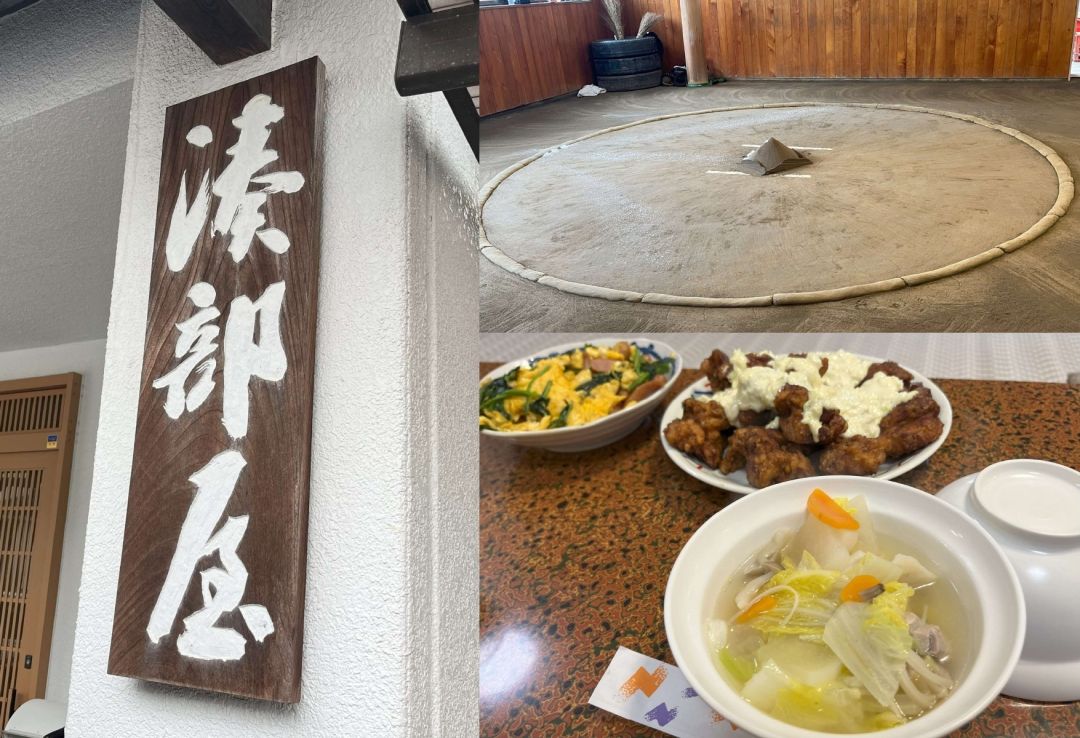
Bring a Wholesome Body and Mind with Karate Training! ~Shiwasuda Elementary School Karate Course~
“Karate”, it is one of traditional Japanese martial arts that has become an Olympic event in the Tokyo 2020 Olympic and Paralympic Games.
Today, I visited to cover Kawaguchi Municipal Shiwasuda Elementary School and see “Shiwasuda Elementary School, Karate Course” which is held on every Monday.
As a former enthusiast of Aikido, I, who was in charge of this report, was a bit excited about bathing in the distinctive atmosphere of Dojo-gym. Members of that day were fourteen children under the age of fifteen (two of them came for a trial lesson) and an adult. Just a mere sight of them cladding in white Dogi-uniforms was enough to tense me up.
Leading warm-up exercises for the entire trainees was a Junior High schooler girl with a black belt. Now, second year of Junior High School, she has been taking training since she was attending a kindergarten.
I waited for a break to ask her about what was the Karate’s most fascinating part for her.
“At the beginning, learning new kata-fixed sequences fascinated me so much. After I was given a black belt, I am taking trainings more ardently in order to reach the level of remarkable masters around me”.
Her brisk answers made me a really good impression that Karate training will not only trains performance skills, but also trains your body and mind. She was teaching basic movements to kids of white belt group after the warm-up exercises.
I also talked with the Master of Dojo. This Dojo-gym has concrete precepts called Dojo-kun (general rule intends to regulate behaviors, mindset / method of training) and other mental preparedness. Trainees are supposed to read it out loud before starting trainings. I believe your mind must be trained through Karate because it includes disciplinary trainings like this,
Let me introduce their Dojo-kun.
1. Strive for the formation of character
2. Give prominence to the proprieties
3. Restrain an impulse of being a blind daring
4. Cultivate a spirit of effort
5. Follow the way of sincerity
Their attempt at working side by side with local community is one of the examples of putting Dojo-kun principles into practice. In September 2024, they have paid a visit to Kawaguchi City Comprehensive Welfare Center for the Elderly “Home for the Elderly Requiring Special Care : SANTEPIA” and Kawaguchi City Kamine Welfare Center to display martial arts to cheer up residents there.
This school teaches an authentic Karate, which is comprised of Kumite-sparring and Kata-fixed sequence of movements. It might be easier to imagine it from what you saw at the Olympic events. Kumite means one-on-one sparring style, and this school employs a style of “Sundome”, in which you stop your force at the very edge of the opponent’s body. “Wadoryu” is the name of this school, which is characterized by making the best of natural movements of human body. It has a similarity with the movements of Aikido.
Practice matches including matches of kata, display of fixed-sequence of movements contested by solo-player, were held on the day I visited. Each quick movement, serene voice, rustle of chafing Dogi, will never misses to overwhelm you. This really is the essence of martial arts!
Master of this school ingeniously arranges the operation of this school. Each trainee is given an attendance card. Every time they come to the training, they will get a sticker. If you win at a practice match, you will get four stickers. The school tries to visualize each trainee’s progress in this way. This method stimulates trainees’ enthusiasm, they said.
Practicing earnestly, strictly, I was impressed by this school’s brilliant operation method which employs idea of full of enjoyable arrangements.
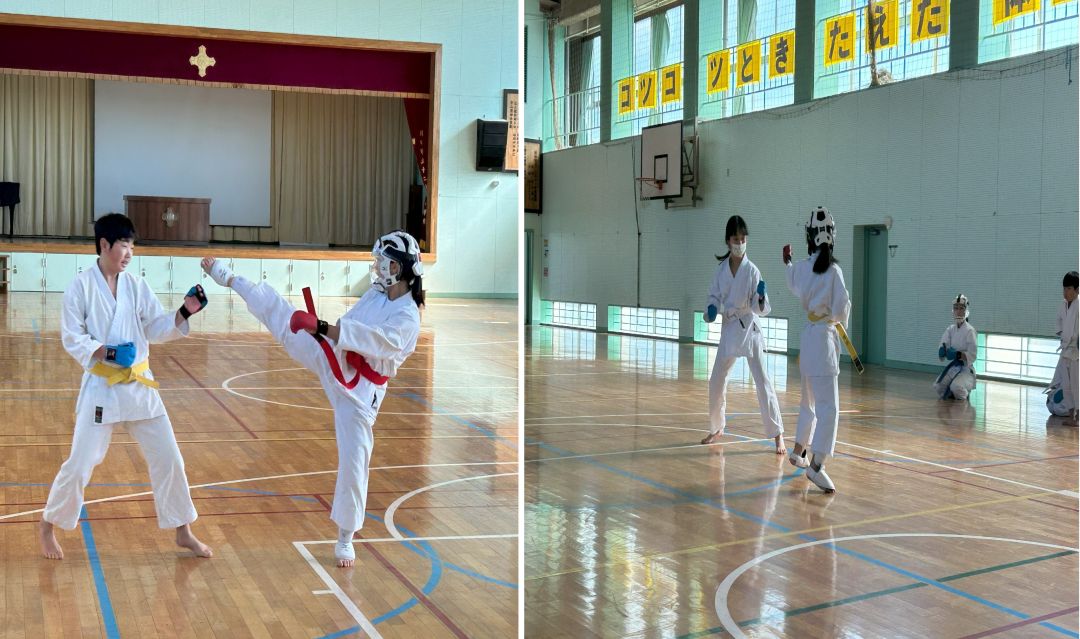
Information on Shiwasuda Elementary School Karate Course:
Address: 11-1, Asahi 1-chome, Kawaguchi City, Saitama Prefecture.
〒332-0001
URL:https://shiwasuda.crayonsite.net/
Experience of making real kimchi with people of regional communities 〜How about getting to know each other better through “Kimjang”?〜
Have you ever heard of the word, “Kimjang”?
In Korea there’s a custom called “Kimjang”, which indicates pickling a quantity of Kimchi in each family and local communities before winter.This function which can be said a special attraction of winter is an important event in both families and local communities.Member of families and people of communities gather and cooperate pickling Kimchi on that day.
Do you know there is a workshop that we can actually experience “Kimjang “ in Kawaguchi City?
I joined a workshop of Korean cooking which was held at community center at Namiki in Kawaguchi city on December 28 (Thursday), 2024.The main event of that day was making Kimchi. In addition we cooked together three other dishes for lunch. First, Pugok, which is dried cod soup. Second, Possam, which is boiled pork and third, Chijimi.
Exactly a scenery of “Kimjang” spreaded during the workshop. Participants made a great deal of Kimchi by working together.
There are three steps to make Kimchi. Firstly we cut salted Chinese cabbages into four pieces. Secondly we spread politely between leaves two kinds of seasonings which are fermented chili peppers, shrimp and sardines and Yangnyeom which is mixed spices of like shredded radish and green onion. Then we wrap up whole of them with leaves of Chinese cabbages. Finally this is the end of making Kimchi.
We tend to eat it at once as just made Kimchi gives a nice scent. It is said that it’s better to wait until it will be fermented a bit so that we can enjoy it. We can take it home and eat it. It’s one of joy that we taste and see it how it is.
Flavor of Pugok makes us warm from both physically and mentally as the taste of cod is consented. Possam is cooking together pork back ribs with seasonings like Doenjang until it becomes soft. Then we wrap them with Sanchu or salted Chinese cabbages and eat them. In addition Chijimi including a lot of onions, carrots and garlic chives were particularly delicious with special sauce.Lunch all of the participants made included plenty of vegetables and each dishes were perfect.
This time 15 people who were both first and repeat participants lively enjoyed making Kimchi. Good-natured personality of Ms Lee who is a teacher that held the cooking class made the time pass at once in cosy atmosphere.
●Voice of participants
“A-san” whom I cooked at the same table together.(She has attended the cooking class for three years. She took part in them excitingly with her friends.) : I enjoyed making Kimchi every year.I’m very pleased to experience Kimjang with everybody.
“B-san” who was a companion at lunch. (This time, she’s attended them for the second time.): I enjoyed a lot to have participated in them as Ms Lee invited me.
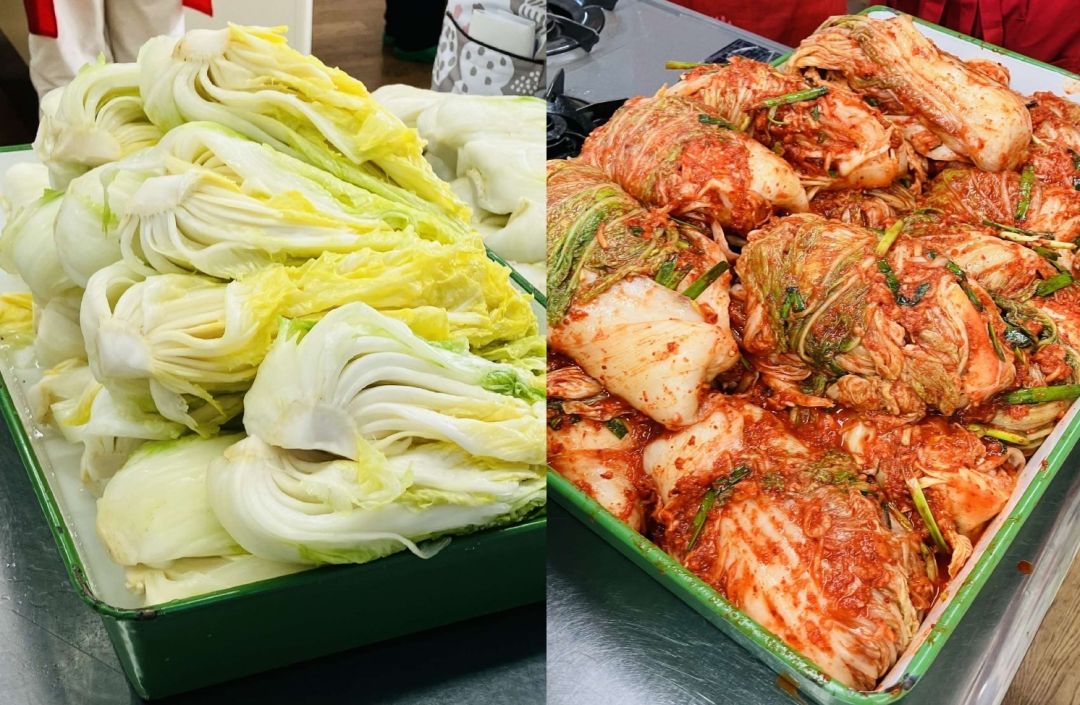
●Interview with Ms Lee
First reason why Ms Lee Sookhyung to hold the cooking classes were held as return of favor for those who lived in the same flat that took care of her a lot.To get to know each other better she started to hold the cooking classes at home as she wanted to cook Korean dishes and talk with eating.Afterwards she started to hold the classes at community center as participants increased by teaching Korean, too.
The handmade Korean dishes which were made with plenty of vegetables, genuine seasonings and spices were family-minded and somehow nostalgic. How about deepening our friendship by attending “Kimjang “?
※To those who wants to join the cooking classes.
Please make it sure by calling the Namiki community center as it is held at the end of November every year.
Editor’s postscript
Making Kimchi was precious experience.
I could get a broader view of Kimchi as there were seasonings and fermented food for the first time pickled with it. Please join in making Kimchi next year if you are interested in it. By Mimoza
